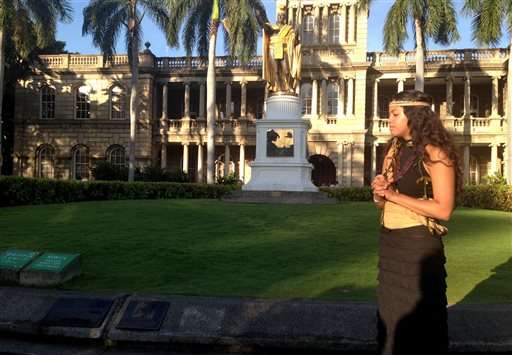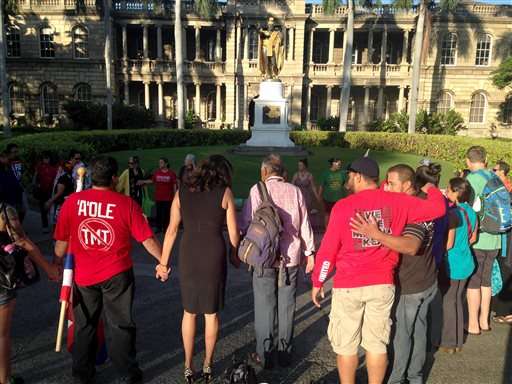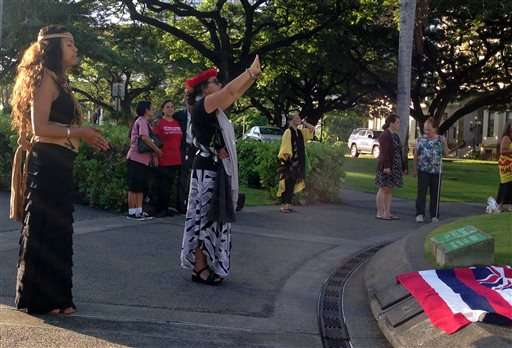Hawaii Supreme Court hears Mauna Kea telescope case

Hawaii's Supreme Court heard oral arguments in a case involving building one of the world's largest telescopes on Mauna Kea.
Opponents, who are against building the Thirty Meter Telescope on land that many Native Hawaiians consider sacred, are challenging a permit that would allow the telescope to be built on conservation land on Hawaii's Big Island.
Lawyers delivered opening arguments in the case Thursday, and justices questioned why the state department that issued the permit did so when there were ongoing challenges to the project. The judges also discussed the impact of one more telescope on the mountain.
In a packed courtroom with more than 200 onlookers, the telescope opponents softly sang a ballad called "Ku Haaheo," which is Hawaiian for "stand proud," before and after the proceedings. One man held a bundle of ti leaves high in the air as they sang.
"Mauna Kea is more than a mountain. It is the embodiment of the Hawaiian people," Richard Naiwieha Wurdeman, attorney for petitioners, told the court.
"This is, as the court is well aware, one of the most significant and important cultural sites in Hawaii. It is the source of the geological story of the Hawaiian people," Wurdeman continued.

Astronomers revere the site because Mauna Kea's summit at nearly 14,000 feet is well above the clouds, and provides a clear view of the sky for 300 days a year.
"The ultimate final decision of the board granting the (permit) represents the culmination of a process of years of community outreach, of dialogue, of listening, revising, reducing, modifying, mitigating, conditioning to a degree that is unprecedented in the history of astronomy at Mauna Kea," said Jay Handlin, attorney for the University of Hawaii, which sub-leases the land atop Mauna Kea for the telescope project.
While the state Board of Land and Natural Resources was reviewing the permit, the petitioners had requested a "contested case hearing," which is a quasi-judicial procedure to review potential impacts of a state agency's decision on peoples' rights and privileges. But the petitioners say the permit for the telescope was issued before the contested cases were resolved.
"A fair trial in a fair tribunal is a basic requirement of due process," Associate Justice Sabrina McKenna said. "Do you think that due process would allow the court, for example, in trial in a situation in which a plaintiff filed a lawsuit, for the judge to say, 'Here is my judgment in favor of the plaintiff. We will now have a trial. And if you convince me otherwise, I'll change my mind?'"
"Courts do exactly that all the time," Handlin said, comparing the situation to when a judge grants a preliminary injunction.

"I don't remember ever making a decision where I decided the case before the trial," said Associate Justice Richard Pollack.
Williamson Chang, a law professor at the University of Hawaii who works closely with the Hawaiian sovereignty movement, said the justices were tough on the lawyers from the state and university.
"They're doing something that I haven't seen in a long time," Chang said. "They're telling the little guy, 'We're going to protect you when the stakes are unfair.'"
Construction halted in April after dozens of protesters were arrested for blocking crews.
The Supreme Court agreed to hear the case, allowing it to bypass the Intermediate Court of Appeals.
© 2015 The Associated Press. All rights reserved.




















